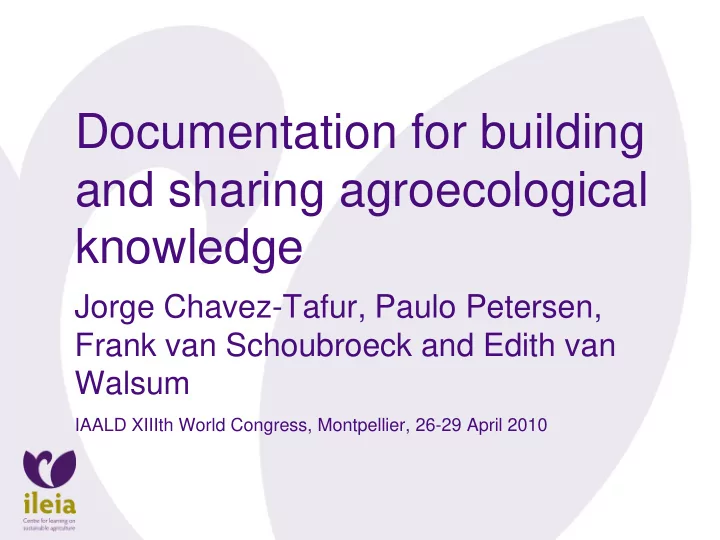

Documentation for building and sharing agroecological knowledge Jorge Chavez-Tafur, Paulo Petersen, Frank van Schoubroeck and Edith van Walsum IAALD XIIIth World Congress, Montpellier, 26-29 April 2010
ileia Centre for Learning on Sustainable Agriculture
• Increasing recognition of the importance of agriculture for development • Increasing recognition that “business as usual is not an option” • But practices which are already contributing get little visibility
For 25 years, ILEIA has been promoting the exchange of information about small scale farming all over the world identifying initiatives and interesting developments taking place at the local level – and sharing them with a wider audience
ILEIA Newsletter LEISA Magazine Farming Matters 20,000 subscribers 150 countries
• 7 regional editions • 30,000 more subscribers
Results: • Articles used as training material • Used for awareness raising purposes • A source of inspiration
• A learning process resulting from the many activities taking place in the field and from the exchange of information • But – a process that does not happen often enough, as a result of many different reasons
• Many efforts, many ideas on capitalisation sistematizacion documentation • And many organisations trying to promote this
Since 2007, ILEIA has been running a documentation programme: • Capacity building of regional partners • An increased documentation of field experiences • Validation of documentation methods and the dissemination of results
Work started with the publication of a short manual / set of guidelines which was later “tried” in many different contexts (with and without involvement of ILEIA and its partners)
• VETAID, Mozambique • CONCERN, Tanzania • SEE, Inner Mongolia, China • Misereor partners, India and Bangladesh • DURAS project, Vietnam and Benin • Intercooperation, Pakistan • ANA, Brazil
These “cases” led to • several articles published on our magazines • funding proposals and PR material • learning: “ it is during this process that I’ve learned most about my project ” • lessons about documentation
What drives organisations to document their work? • Their desire “ to show what we do ” • to understand what happened, and why did that happen • to “ develop a collective reflection process ” • to “ help break the feeling of isolation ”
What to document? • Field experiences • A social innovation process, such as the establishment of specific partnerships • “Best practices”?? • Ownership if the information (eg IPRs) • A process of unexpected results
Who is to be involved? • A participatory process, many stakeholders • The “owners” of the experience • Representativeness • Time, resources and other issues • A co-ordination role • Power issues
And how to go about it? • Follow some principles, not a recipe • Setting boundaries and describing • Analysis and conclusions • A detailed plan • Emphasis on the dissemination of results
Documentation / capitalisation / sistematizacion can • increase visibility • enhance (collective) learning • help build knowledge on agroecology and sustainable agriculture We tried to follow our own advice and learned from practice
Further challenges • Dissemination of results + lessons • Promote more documentation processes • Focus on institutional innovations • Attention to policy and advocacy issues
Thank you!
Recommend
More recommend